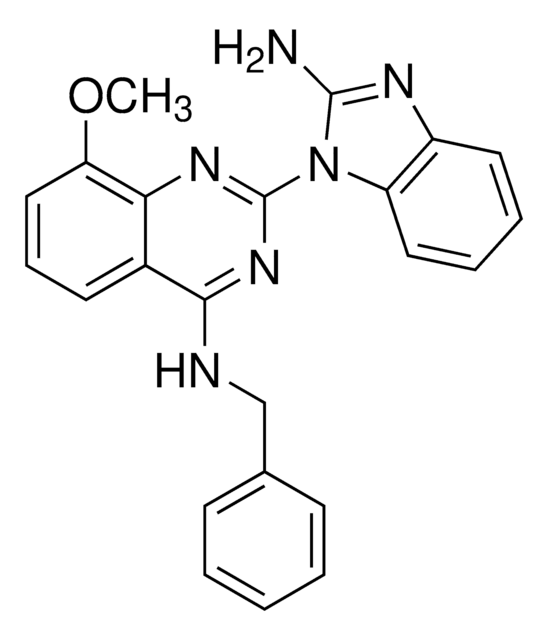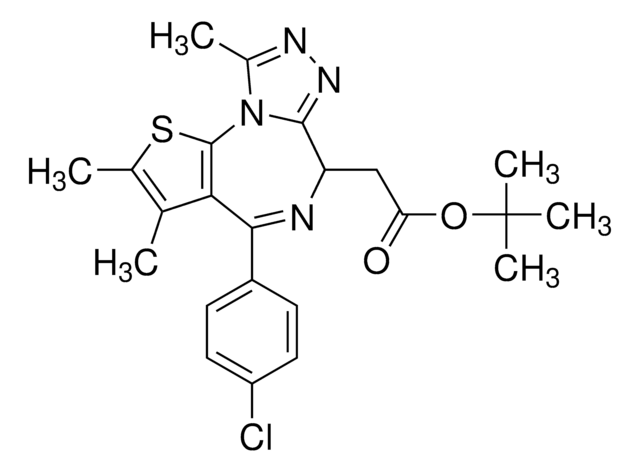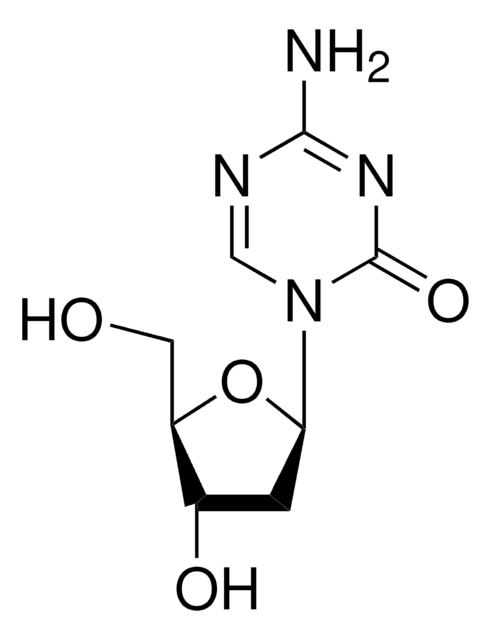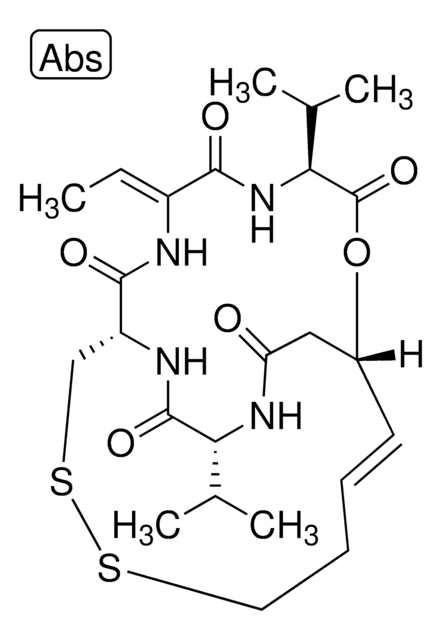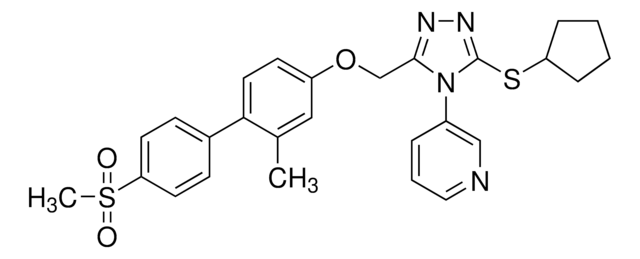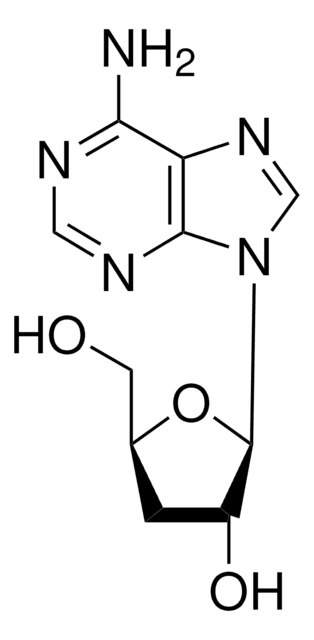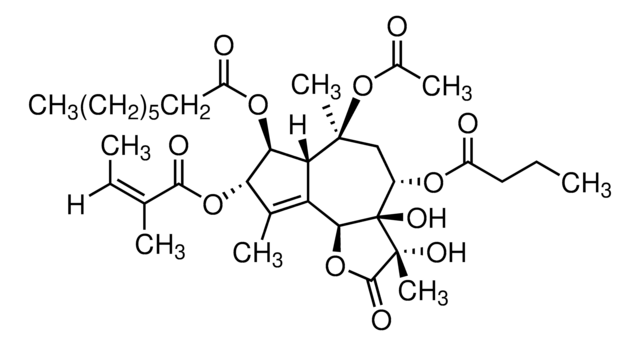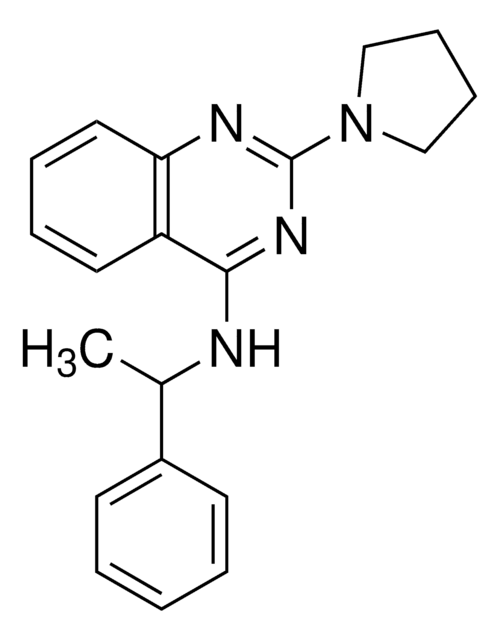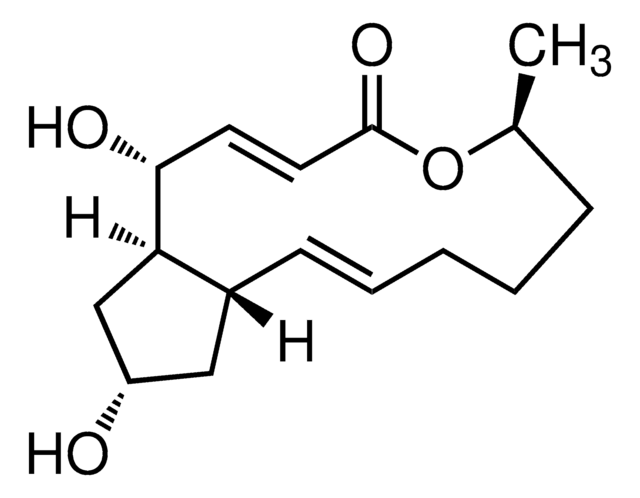Wszystkie zdjęcia(1)
Kluczowe dokumenty
SML0031
DBeQ
≥98% (HPLC)
Synonim(y):
JRF 12, N2,N4-dibenzylquinazoline-2,4-diamine
Zaloguj sięWyświetlanie cen organizacyjnych i kontraktowych
About This Item
Wzór empiryczny (zapis Hilla):
C22H20N4
Numer CAS:
Masa cząsteczkowa:
340.42
Numer MDL:
Kod UNSPSC:
12352200
Identyfikator substancji w PubChem:
NACRES:
NA.77
Polecane produkty
Poziom jakości
Próba
≥98% (HPLC)
Formularz
powder
kolor
white to beige
rozpuszczalność
DMSO: ≥20 mg/mL
temp. przechowywania
room temp
ciąg SMILES
C(Nc1nc(NCc2ccccc2)c3ccccc3n1)c4ccccc4
InChI
1S/C22H20N4/c1-3-9-17(10-4-1)15-23-21-19-13-7-8-14-20(19)25-22(26-21)24-16-18-11-5-2-6-12-18/h1-14H,15-16H2,(H2,23,24,25,26)
Klucz InChI
QAIMUUJJAJBPCL-UHFFFAOYSA-N
Powiązane kategorie
Zastosowanie
HeLa cells were treated with DBeQ and the effects on in vivo ubiquitination and protein dislocation were studied by live cell imaging.
Działania biochem./fizjol.
ATPase p97 inhibitor.
DBeQ is a potent and specific inhibitor of ATPase p97, an integral component of the ubiquitin-fusion degradation (UFD) pathway. DBeQ inhibits the degradation of ubiquitinated proteins, the endoplasmic reticulum-associated degradation pathway, and autophagosome maturation. The compound also potently inhibits cellular proliferation and induces caspase 3/7 activity and apoptosis.
Ta strona może zawierać tekst przetłumaczony maszynowo.
Kod klasy składowania
11 - Combustible Solids
Klasa zagrożenia wodnego (WGK)
WGK 3
Wybierz jedną z najnowszych wersji:
Masz już ten produkt?
Dokumenty związane z niedawno zakupionymi produktami zostały zamieszczone w Bibliotece dokumentów.
Klienci oglądali również te produkty
Holger W Auner et al.
PloS one, 8(9), e74415-e74415 (2013-09-27)
Inhibition of the proteasome is a widely used strategy for treating multiple myeloma that takes advantage of the heavy secretory load that multiple myeloma cells (MMCs) have to deal with. Resistance of MMCs to proteasome inhibition has been linked to
Yongwang Zhong et al.
The Journal of biological chemistry, 287(33), 28057-28066 (2012-06-23)
Misfolded proteins in the endoplasmic reticulum (ER) are dislocated to the cytosol to be degraded by the proteasomes. Various plant and bacterial toxins and certain viruses hijack this dislocation pathway to exert their toxicity or to infect cells. In this
Angela McHugh et al.
The Journal of investigative dermatology, 140(6), 1154-1165 (2019-11-11)
We performed a small interfering RNA screen to identify targets for cutaneous squamous cell carcinoma (cSCC) therapy in the ubiquitin/ubiquitin-like system. We provide evidence for selective anti-cSCC activity of knockdown of the E3 ubiquitin ligase MARCH4, the ATPase p97/VCP, the
Shana D Hardy et al.
Oncotarget, 8(61), 103302-103314 (2017-12-22)
Processing bodies (P-bodies) are ribonucleoprotein complexes involved in post-transcriptional mRNA metabolism that accumulate in cells exposed to various stress stimuli. The treatment of mammary epithelial cells with transforming growth factor-beta (TGF-β), triggers epithelial-mesenchymal transition (EMT), and induces the formation of
Ajit Tiwari et al.
Scientific reports, 6, 38681-38681 (2016-12-09)
Caveolin-1 (Cav1) drives the formation of flask-shaped membrane invaginations known as caveolae that participate in signaling, clathrin-independent endocytosis and mechanotransduction. Overexpression or mutations of Cav1 can lead to its mistrafficking, including its accumulation in a perinuclear compartment previously identified as
Produkty
We presents an article on Autophagy in Cancer Promotes Therapeutic Resistance
Nasz zespół naukowców ma doświadczenie we wszystkich obszarach badań, w tym w naukach przyrodniczych, materiałoznawstwie, syntezie chemicznej, chromatografii, analityce i wielu innych dziedzinach.
Skontaktuj się z zespołem ds. pomocy technicznej